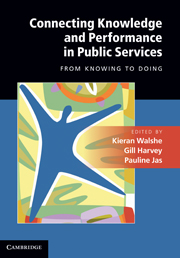Book contents
- Frontmatter
- Contents
- List of figures
- List of tables
- List of boxes
- Notes on contributors
- Foreword
- 1 Introduction: knowledge and performance – theory and practice
- 2 Knowledge from inspection: external oversight and information to improve performance
- 3 How is information used to improve performance in the public sector? Exploring the dynamics of performance information
- 4 Citizens, users or consumers: the voice of the public and its influence on improving performance
- 5 Competition and choice: the place of markets in connecting information and performance improvement
- 6 The role of corporate governance and boards in organisational performance
- 7 Change at the top: connecting political and managerial transitions with performance
- 8 The role of leadership in knowledge creation and transfer for organisational learning and improvement
- 9 Process Improvement and Lean Thinking: using knowledge and information to improve performance
- 10 Using evidence: how social research could be better used to improve public service performance
- 11 Absorptive capacity: how organisations assimilate and apply knowledge to improve performance
- 12 Knowing through doing: unleashing latent dynamic capabilities in the public sector
- 13 Conclusions: a puzzle, three pieces, many theories and a problem
- Index
- References
1 - Introduction: knowledge and performance – theory and practice
Published online by Cambridge University Press: 05 July 2011
- Frontmatter
- Contents
- List of figures
- List of tables
- List of boxes
- Notes on contributors
- Foreword
- 1 Introduction: knowledge and performance – theory and practice
- 2 Knowledge from inspection: external oversight and information to improve performance
- 3 How is information used to improve performance in the public sector? Exploring the dynamics of performance information
- 4 Citizens, users or consumers: the voice of the public and its influence on improving performance
- 5 Competition and choice: the place of markets in connecting information and performance improvement
- 6 The role of corporate governance and boards in organisational performance
- 7 Change at the top: connecting political and managerial transitions with performance
- 8 The role of leadership in knowledge creation and transfer for organisational learning and improvement
- 9 Process Improvement and Lean Thinking: using knowledge and information to improve performance
- 10 Using evidence: how social research could be better used to improve public service performance
- 11 Absorptive capacity: how organisations assimilate and apply knowledge to improve performance
- 12 Knowing through doing: unleashing latent dynamic capabilities in the public sector
- 13 Conclusions: a puzzle, three pieces, many theories and a problem
- Index
- References
Summary
The performance of public services is now more closely scrutinised than ever before. In the current age of hyper-accountability – what Michael Power (1999) memorably termed the ‘audit society’ – every teacher, doctor, social worker or probation officer knows that behind them stands a restless army of overseers, equipped with a panoply of league tables, star ratings, user opinion surveys, performance indicators and the like with which to judge them. It can seem to these public servants as if regulators, inspectors, government, politicians, the media, pressure groups and assertive service users line up to berate them for their shortcomings, criticise their failings and make ever more challenging demands on their services. Those who lead public organisations – chief executives, head teachers, directors and others – may with reason feel acutely vulnerable and personally exposed to the risks of any failure, whatever its cause, within their organisation.
The era of passive, compliant, respectful and grateful public service users; authoritative, distant and unchallengeable professionals; and comfortable, complacent, conservative and unchanging public bureaucracies is long gone. Those who feel a tinge of nostalgic warmth for times past should remind themselves that, rather than this being a halcyon age for public services, it was a time when mediocrity and incompetence were tolerated or ignored in public services, when poor standards or inadequate performance often persisted for years, and when a ‘club culture’ evolved in which public services often seemed to be organised to benefit their staff, not their users or the public (Kennedy 2001).
Information
- Type
- Chapter
- Information
- Connecting Knowledge and Performance in Public ServicesFrom Knowing to Doing, pp. 1 - 15Publisher: Cambridge University PressPrint publication year: 2010
